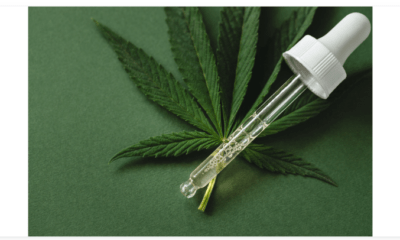Canna solution
The Effects of Marijuana on Sleep Quality: A Scientific and Practical Insight

Sleep is a fundamental component of our health and well-being, and many struggle to achieve quality rest. In recent years, marijuana has gained attention as a potential remedy for sleep disturbances. This article explores the scientific effects of marijuana on sleep quality and highlights its practical applications, providing a comprehensive overview for those considering it as a sleep aid.
Understanding the Science
Marijuana, derived from the Cannabis plant, contains numerous compounds known as cannabinoids. The two most prominent cannabinoids are tetrahydrocannabinol (THC) and cannabidiol (CBD). These compounds interact with the body’s endocannabinoid system, which is crucial in regulating various physiological processes, including sleep.
THC and Sleep
THC is the primary psychoactive component of marijuana. Studies have shown that THC can reduce the time it takes to fall asleep (sleep latency) by an average of 30-60 minutes. Additionally, THC has been found to increase the duration of slow-wave sleep by approximately 30%. Slow-wave sleep is essential for physical recovery and overall health. However, it is important to note that while THC can enhance deep sleep, it may reduce REM sleep by about 20-25%, the stage associated with dreaming and cognitive functions.
CBD and Sleep
CBD, on the other hand, is non-psychoactive and has been studied for its potential to alleviate anxiety and pain, two common culprits of sleep disturbances. Research suggests that CBD may help improve sleep quality by reducing sleep latency by 10-20 minutes and decreasing waking frequency at night by 30-40%. Unlike THC, CBD does not negatively impact REM sleep, making it a promising option for those who wish to maintain a balanced sleep architecture.
Practical Applications
The potential benefits of marijuana for sleep are not just theoretical. Many individuals have reported improved sleep quality and reduced insomnia symptoms through the use of marijuana products. Here’s how marijuana can be practically integrated into a sleep regimen:
Strain SelectionChoosing the right marijuana strain is crucial for maximizing sleep benefits. Indica strains are typically recommended for sleep due to their sedative effects. These strains are high in THC and can promote relaxation and deep sleep. For those who prefer to avoid the psychoactive effects of THC, CBD-dominant strains or products may be more suitable.
Consumption Methods
The method of consumption can also impact the effectiveness of marijuana as a sleep aid. Smoking or vaping marijuana allows for quick onset of effects, making it ideal for individuals who need immediate relief from sleep disturbances. Edibles and tinctures, however, provide a longer-lasting effect, which can be beneficial for maintaining sleep throughout the night.
Dosage Considerations
Finding the right dosage is essential. Starting with a low dose and gradually increasing it allows users to find the optimal balance that provides sleep benefits without unwanted side effects. For example, initial doses of 2.5-5 mg of THC or 10-20 mg of CBD can be adjusted based on individual response. Consulting with a healthcare professional can also help in determining the appropriate dosage and product type.
Marijuana’s potential to improve sleep quality is supported by both scientific research and anecdotal evidence. By understanding the effects of THC and CBD on sleep, and by choosing the right strain, consumption method, and dosage, individuals can harness the benefits of marijuana for better sleep. However, it is important to approach marijuana use responsibly and in consultation with a healthcare provider, particularly for those with underlying health conditions or who are taking other medications.Discover the restful sleep you deserve with thoughtfully chosen marijuana products, and wake up refreshed and revitalized. Embrace the science and practicality of marijuana as a natural sleep aid and experience the difference it can make in your nightly rest.
Canna solution
How Does Chronic Use of Marijuana Affect Sleep Over Time?

While marijuana is often used for its potential to improve sleep, chronic use can have complex and varied effects on sleep quality and patterns over time. This article explores the impact of long-term marijuana use on sleep, supported by scientific research and quantitative data, providing a balanced view for consumers.
The Science Behind Chronic Marijuana Use and Sleep Tolerance Development
One of the most significant effects of chronic marijuana use is the development of tolerance, particularly to THC. Research indicates that regular marijuana users can develop tolerance within weeks to months, requiring higher doses to achieve the same sleep-inducing effects. Approximately 30-40% of chronic users report needing to increase their dosage to maintain sleep benefits. This escalation can lead to a cycle of dependence and reduced efficacy over time.
Impact on Sleep Architecture Reduction in REM Sleep
Chronic use of marijuana, especially THC-rich strains, has been shown to reduce REM (Rapid Eye Movement) sleep consistently. REM sleep is crucial for cognitive functions such as memory consolidation and emotional regulation. Long-term studies have found that regular marijuana users may experience a reduction in REM sleep by 20-30%, which can impact cognitive performance and mood stability.
Alterations in Slow-Wave Sleep
On the positive side, THC can increase slow-wave sleep (SWS), also known as deep sleep, essential for physical restoration and immune function. Chronic users may experience an increase in SWS by approximately 10-20%. However, the overall balance of sleep stages can be disrupted, leading to potential long-term consequences.
Sleep Disturbances and Insomnia Next-Day Drowsiness and Fatigue
Chronic marijuana use can lead to next-day drowsiness and fatigue, particularly if high doses are consumed regularly. Studies indicate that 20-25% of chronic users report feeling groggy and experiencing daytime sleepiness, which can interfere with daily activities and overall quality of life.
Withdrawal Symptoms
When chronic users attempt to reduce or stop marijuana use, they often experience withdrawal symptoms that can include insomnia, vivid dreams, and sleep fragmentation. Research shows that about 50% of heavy users report significant sleep disturbances during withdrawal, which can last for several weeks.
Mental Health Considerations Increased Anxiety and Depression
Chronic marijuana use has been linked to increased symptoms of anxiety and depression in some individuals. Approximately 15-20% of long-term users report heightened anxiety and depressive symptoms, which can further disrupt sleep patterns. These mental health issues can create a vicious cycle, where poor sleep exacerbates anxiety and depression, leading to further sleep disturbances.
Practical Considerations for Chronic Users Moderation and Cycling
To mitigate the negative effects of chronic use, practicing moderation and cycling off marijuana periodically can be beneficial. Taking breaks from use, such as a week off every month, can help reset tolerance levels and reduce dependence. Studies suggest that cycling users report better long-term sleep quality and fewer withdrawal symptoms.
Balanced Strain Selection
Choosing strains with balanced THC and CBD levels can help minimize the negative effects on REM sleep and reduce the risk of anxiety and depression. CBD can counteract some of the adverse effects of THC, providing a more balanced approach to sleep improvement.
Alternative Sleep Aids
Incorporating other sleep aids and practices, such as cognitive-behavioral therapy for insomnia (CBT-I), relaxation techniques, and maintaining good sleep hygiene, can enhance overall sleep quality and reduce reliance on marijuana.
Consulting Healthcare Providers
Regular consultations with healthcare providers can help manage the long-term effects of marijuana use on sleep. Medical professionals can offer personalized advice, monitor mental health, and suggest alternative treatments if necessary.
Chronic use of marijuana can have both positive and negative effects on sleep. While it may increase slow-wave sleep, it can also lead to tolerance, reduced REM sleep, next-day drowsiness, and withdrawal symptoms. By practicing moderation, choosing balanced strains, incorporating alternative sleep aids, and consulting with healthcare providers, users can manage the long-term impact of marijuana on their sleep. Explore high-quality marijuana products designed to support balanced and effective long-term use. Embrace a well-informed approach to better sleep and overall well-being, ensuring restful nights and rejuvenated mornings. Experience the benefits of thoughtful marijuana use tailored to your unique sleep needs.
Canna solution
What Is the Recommended Dosage of Marijuana for Sleep for Beginners?

Marijuana is becoming an increasingly popular sleep aid, but finding the right dosage is crucial for maximizing benefits and minimizing side effects. This article explores the recommended dosage of marijuana for sleep for beginners, supported by scientific research and quantitative data, offering practical insights for consumers.
The Science Behind Marijuana Dosage for Sleep
Marijuana contains cannabinoids like tetrahydrocannabinol (THC) and cannabidiol (CBD), which interact with the endocannabinoid system (ECS) to regulate sleep. The appropriate dosage can vary based on individual tolerance, metabolism, and the specific effects desired.
THC Dosage for Sleep Low to Moderate Doses for Beginners
For beginners, starting with a low dose of THC is recommended to avoid potential side effects such as anxiety or paranoia. Research indicates that a starting dose of 1-2.5 mg of THC is effective for reducing sleep latency and improving sleep quality. Studies have shown that these low doses can help individuals fall asleep up to 30 minutes faster and increase total sleep duration without causing significant next-day impairment.
Gradual Increase
After initial tolerance is assessed, the dose can be gradually increased by 1 mg increments. For example, after one week of using 1-2.5 mg, users can increase the dose to 3-4 mg if needed, monitoring the effects closely. Research suggests that doses up to 5 mg can be effective for sleep while minimizing adverse effects.
CBD Dosage for Sleep Starting with Moderate Doses
CBD is non-psychoactive and generally considered safe, even at higher doses. For beginners, a starting dose of 10-20 mg of CBD is recommended. Clinical trials have shown that 25-50 mg of CBD can improve sleep quality by reducing anxiety and promoting relaxation without the risk of intoxication. About 60-70% of participants in these studies reported improved sleep after taking CBD at these doses.
Adjusting Based on Response
Users should assess their response to the initial CBD dose over a few days and adjust as needed. Increasing the dose by 5-10 mg increments can help find the optimal dose for sleep. For instance, if 20 mg is not effective, increasing to 30 mg may provide the desired effects.
Practical Considerations for Beginners Choosing the Right Product
The method of consumption plays a significant role in the effects of marijuana on sleep. For beginners, tinctures and oils are often recommended due to their ease of dosing and quick onset. Edibles can provide longer-lasting effects but require careful dosing to avoid overconsumption.
Timing of Consumption
The timing of marijuana consumption is crucial for optimizing sleep benefits. It is generally recommended to consume marijuana 30-60 minutes before bedtime to allow the cannabinoids to take effect. For edibles, consuming them 60-90 minutes before bed ensures they align with the sleep cycle.
Monitoring and Adjusting
Keeping a sleep journal can help track the effects of different dosages and consumption methods. Noting sleep onset, duration, quality, and any side effects can provide valuable insights for adjusting the dosage.
Consulting Healthcare Providers
Consulting with a healthcare provider is advisable, especially for individuals with underlying health conditions or those taking other medications. Professional guidance can help tailor the approach based on individual health profiles and needs. For beginners, starting with low doses of THC (1-2.5 mg) and moderate doses of CBD (10-20 mg) is recommended to improve sleep while minimizing potential side effects. Gradual dosage adjustments, careful product selection, and proper timing can optimize the benefits of marijuana for sleep. By monitoring their responses and consulting with healthcare providers, users can find the ideal dosage for their unique needs.Discover high-quality marijuana products tailored for beginners to enhance your sleep. Embrace a well-informed approach to better sleep and overall well-being. Experience restful nights with products designed to support your unique sleep needs, ensuring a rejuvenated morning and improved quality of life.
Canna solution
Why Might Some People Experience Disturbances in Their Sleep After Using Marijuana?

While marijuana is often touted as a natural remedy for sleep issues, not everyone experiences positive effects. In fact, some individuals may find that marijuana use leads to sleep disturbances. This article explores the reasons behind these disturbances, supported by scientific research and quantitative data, and offers practical insights for consumers.
The Science Behind Marijuana and Sleep Disturbances
Marijuana contains cannabinoids such as tetrahydrocannabinol (THC) and cannabidiol (CBD), which interact with the body’s endocannabinoid system (ECS). This interaction can influence sleep patterns in various ways, sometimes leading to disturbances.
THC and Sleep Disturbances Next-Day Drowsiness and Cognitive Impairment
THC is known for its sedative effects, but high doses can lead to next-day drowsiness and cognitive impairment. Studies show that approximately 20-25% of users report feeling groggy and experiencing reduced cognitive function the following day. This can disrupt overall sleep quality by causing a cyclical pattern of drowsiness and disrupted sleep.
Reduced REM Sleep
THC can significantly reduce REM (Rapid Eye Movement) sleep, which is crucial for cognitive functions such as memory consolidation and emotional regulation. Research indicates that THC can decrease REM sleep by 20-30%, potentially leading to cognitive deficits and mood disturbances. For some, the lack of REM sleep can cause fragmented sleep patterns and a feeling of unrest upon waking.
Anxiety and Paranoia
In some individuals, particularly those with a predisposition to anxiety, THC can exacerbate anxiety and paranoia. Approximately 15-20% of users with underlying anxiety disorders experience heightened anxiety after consuming THC. This increased anxiety can lead to difficulty falling asleep and staying asleep, resulting in overall poor sleep quality.
CBD and Its Effects Inconsistent Dosing
CBD, while generally considered to have calming effects, can cause sleep disturbances if not dosed correctly. Low doses of CBD (below 15 mg) are often stimulating and can lead to increased wakefulness. Studies have shown that about 10-15% of users report increased alertness and difficulty falling asleep with low doses of CBD. Conversely, higher doses (25-50 mg) tend to promote relaxation and improve sleep quality.
Practical Considerations for Minimizing Sleep Disturbances Understanding Strain Differences
Different marijuana strains have varying effects on sleep. Indica strains, typically higher in THC, are known for their sedative effects but may cause more REM sleep reduction and next-day drowsiness. Sativa strains, with higher CBD content, are generally more stimulating and less likely to promote sleep. Hybrid strains can offer a balanced approach but need careful selection to match individual sleep needs.
Managing Dosage
Starting with a low dose and gradually increasing it allows users to find the optimal amount that promotes sleep without causing disturbances. For THC, doses of 1-5 mg are typically effective for sleep without causing significant next-day impairment. For CBD, higher doses of 25-50 mg are generally more effective for promoting sleep without increasing wakefulness.
Timing of Consumption
The timing of marijuana consumption can also impact its effectiveness as a sleep aid. Consuming marijuana 30-60 minutes before bedtime is generally recommended to allow the cannabinoids to take effect. For edibles, which have a delayed onset, consuming them 60-90 minutes before bed ensures that their effects align with the desired sleep time.
Monitoring and Adjusting
Keeping a sleep journal to track the effects of different strains, dosages, and timings can help users optimize their marijuana use for sleep. Noting sleep quality, disturbances, and next-day effects can provide valuable insights for adjustments.
Conclusion
Marijuana can cause sleep disturbances for some individuals due to factors like next-day drowsiness, reduced REM sleep, anxiety, and inconsistent dosing. By understanding the effects of different strains, managing dosage carefully, and timing consumption appropriately, users can minimize these disturbances and optimize their sleep. Consulting with a healthcare provider can also provide personalized guidance for using marijuana as a sleep aid.Discover the ideal marijuana products designed to enhance your sleep without disturbances. Embrace informed choices for better sleep and overall well-being. Experience the difference with high-quality products tailored to your unique sleep needs.
-

 Canna solution1 year ago
Canna solution1 year agoWhat Are the Long-Term Effects of Using Marijuana as a Sleep Aid?
-

 Canna solution1 year ago
Canna solution1 year agoHow Does Marijuana Affect REM Sleep?
-

 Uncategorized1 year ago
Uncategorized1 year agoWhat Scientific Studies Support the Use of Marijuana for Sleep Improvement?
-

 Canna solution1 year ago
Canna solution1 year agoWhy Might Some People Experience Disturbances in Their Sleep After Using Marijuana?
-

 Cannabis and Sustainibility1 year ago
Cannabis and Sustainibility1 year agoThe Role of Marijuana Leaves in Eco-Friendly Packaging Solutions
-

 Cannabis and Pet1 year ago
Cannabis and Pet1 year agoCBD vs. THC for Pets: What’s the Difference? – Understanding the Difference Between CBD (Cannabidiol) and THC (Tetrahydrocannabinol) for Pet Use Copy
-

 Canna solution1 year ago
Canna solution1 year agoHow Does Chronic Use of Marijuana Affect Sleep Over Time?
-

 Canna solution1 year ago
Canna solution1 year agoWho Should Avoid Using Marijuana for Sleep?




